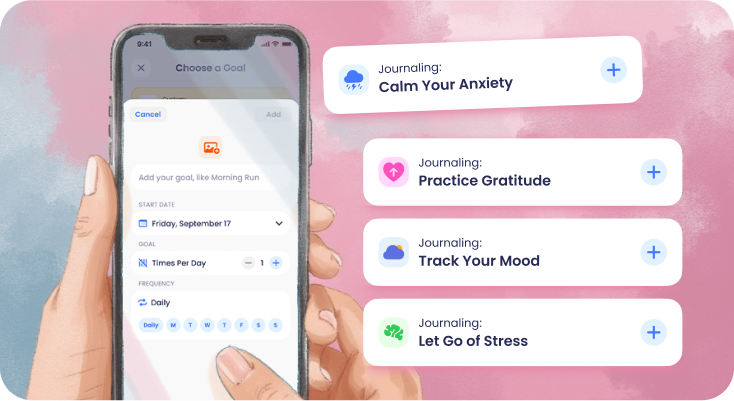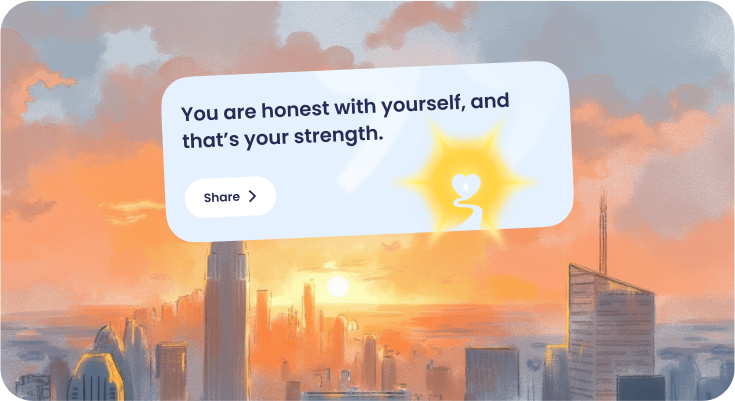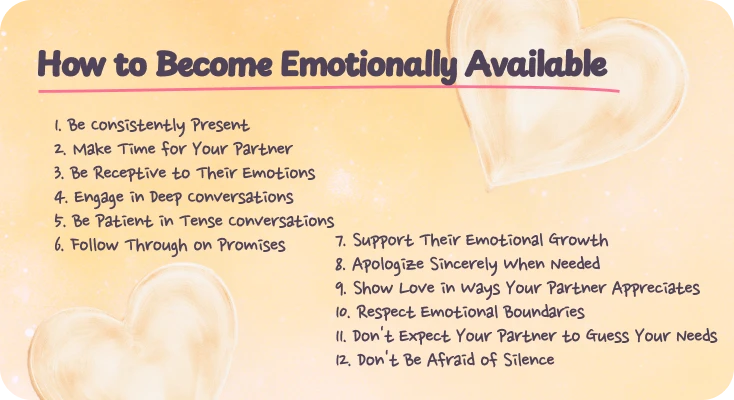Have you ever heard from your partner something like “I feel like you’re not really here with me” or “You never open up to me”? Maybe they told you, “It feels like you don’t care about how I feel,” even though it’s absolutely not true? These situations can make you think, “How to be emotionally available?”
If you’re wondering how to become more emotionally available to your partner, here is some advice to help you build a more connected relationship. You may start by taking Emotional Intelligence Test to increase your self-awareness and find out whether you are empathetic and how well you can manage your emotions.
What Does It Mean To Be Emotionally Available?
Emotional availability is the ability of two people to connect with each other on an emotional level for a healthy and strong relationship. It allows partners to share their thoughts without fear of judgment or rejection and feel valued and understood.
“Being emotionally available means being present, engaged, and open with your partner. Ways to do this include openly sharing feelings, listening to your partner, and being vulnerable. Vulnerability and openness are two important key indicators of emotional availability,” – says Emily Mendez, M.S., EdS.
Without emotional availability, misunderstandings can grow, conflicts may remain unresolved, and one or both partners can feel lonely even while together. According to research on impact of emotional unavailability on happiness level, it can erode trust, intimacy, and overall happiness, often leading to conflict, poor mental health, and separation [1].
5 Signs You Are Emotionally Available
Here are some other clear signs of emotional availability:
1. You Are Open About Your Feelings
You express your emotions honestly and aren’t afraid to talk about your feelings. Therefore, you can communicate your emotions without bottling them up. For example, when you return from work, you tell your partner, “I’ve had a tough day, and I’m tired.”
2. You Can Be Vulnerable
You’re comfortable being vulnerable and allow yourself to share personal, sometimes tricky, emotions. You understand that vulnerability may strengthen connections with people. Thus, you express emotional availability and share personal stories with your partner without worrying about being judged or rejected.
3. You Listen Without Judging
When people share their feelings with you, you listen actively without interrupting or offering advice unless asked. You know how to be emotionally available if you listen to understand, not to fix.
As an illustration, when your partner tells you about their day, you listen attentively, sometimes adding supportive comments. Instead of saying, “Well, you should just do this,” it’s more empathetic to say: “That sounds tough. I’m sorry you’re feeling that way.”
4. You Are Empathetic
You make an effort to understand how others feel and offer support when they need it. In this way, you show that you care by validating their emotions.
For instance, if your partner is upset, you can show emotional availability by saying, “I understand how you’re feeling. That would upset me, too.”
5. You Are Non-Defensive
You don’t get defensive when someone says you’ve hurt their feelings. Instead, you listen and try to understand where they’re coming from to fix things.
Expert Insight
Being defensive might feel good at the moment. But, it causes problems later. To avoid being defensive in arguments, don’t rush to defend yourself. Instead, listen to what the other person is saying. Listening to the other person helps them feel heard and understood.
Emily Mendez
Mental health professional
12 Tips on How to Be Emotionally Available
Here are some tips on how to be emotionally invested in your romantic relationships:
1. Be Consistently Present
Make sure you’re there for your partner, not just physically but emotionally, when they need you. Let’s say your partner is having a rough day and struggles with feeling worthless. Try to give them your undivided attention. Avoid distractions like checking your phone or watching TV when your partner is trying to share something important.
2. Make Time for Your Partner
Research on intimate relationships shows that couples who spend more time together usually feel closer to each other [6]. You can try regular “check-ins” with your partner where both of you share your own emotions.
Plan activities for emotional connection, where you can learn how to live in the moment and be present:
- Take walks together if you are wondering how to calm down and regain emotional energy.
- Give each other compliments. Spend some time saying what you love and appreciate about each other. It boosts positivity and confidence if you wonder how to get motivated, and helps both partners feel more valued.
- Have a “no phones” night every week and play games for couples, go out on a date night, discuss motivational podcasts one of you recently listened to or have a chat while baking or cooking at home.
- Listen to music. Create a shared playlist that means something to both of you to clear your mind and create memories.
- Do a hobby together to create special moments. It can be painting, gardening, playing a sport, or doing anything you both enjoy.
- Cuddle or hold hands. Physical closeness is a simple but powerful way to show emotional availability.
- Plan a future trip or adventure. Dreaming and planning something exciting together can give you both something to look forward to, and the planning process can bring you closer.
Breeze helps create a routine that encourages communication and honest dialogue. It offers customized routines to achieve personal goals and journaling with self-reflection prompts that help better understand each other’s needs in a relationship. Breeze combines professional guidance with daily emotional check-ins so that couples can make meaningful progress toward deeper intimacy and security in their love lives.

3. Be Receptive to Their Emotions
Staying open to your partner’s feelings is one of the main green flags in a relationship, according to the research on the impact of emotional intelligence on quality of romantic relationships [2]. When your partner opens up to you, be receptive and avoid shutting them down or dismissing their emotions.
If your partner says they’re sad or upset, show empathy. Instead of offering quick solutions, try saying, “I can see your emotions. Do you want to talk about it? Your feelings are important to me.”
Avoid minimizing your partner’s feelings. Phrases like “It’s not a big deal” or “You shouldn’t feel that way” can feel like gaslighting and make your partner feel unheard.
Provide comfort and affirmation, showing your partner that you care, especially in moments of uncertainty or insecurity. For example, if your partner feels insecure about their appearance or performance, reassure them by saying, “I think you’re amazing, and I love everything about you.”
If you’re looking for ways to make emotional support and self-care a daily habit, the Breeze app offers daily affirmations to help you express appreciation in ways that truly resonate with you and practice gratitude together with your partner.

4. Engage in Deep Conversations
Don’t underestimate the importance of meaningful talks. According to U.S. Centers for Disease Control and Prevention, it can relieve stress and promote resilience [3]. Instead of just discussing your day-to-day activities, ask self-reflection questions and talk about your dreams, fears, and the deeper aspects of your relationship.
Helpful Tip
Ask open-ended questions that help your partner share more, like “What’s been on your mind lately? ” or “How do you feel about what’s coming up?”
5. Be Patient in Tense Conversations
When things get emotional, try to stay calm. If your partner is upset, you may take a moment to think about how to control your emotions before you respond. Sometimes, just listening without defending yourself is the best thing you can do to show emotional availability.
Want to be the best version of yourself in your relationships and improve your empathy and listening skills? The Breeze app offers guided exercises and various self-discovery tests. You may get insights about your personality, relationships, and many other aspects of life to be more available for the people you love.
Ready to understand your anger better? Take the Anger Test and start improving your emotional control.
6. Follow Through on Promises
Show your partner that you are dependable and that they can trust you to keep your word. Thus, if you promise to spend quality time together or attend an important event, follow through.
7. Apologize Sincerely When Needed
If you caused your partner emotional pain, own your mistakes and apologize sincerely. For instance, you may say, “I’m sorry for raising my voice earlier. I know it upset you. Can we talk about it?” A warm apology can show maturity, trust, and emotional availability. Avoid defensive language and focus on how your actions affected your partner.
8. Support Their Emotional Growth
Emotionally available people also support their partners’ growth. If your partner is trying to improve their emotional intelligence in the workplace, manage an uncomfortable situation, or change their life for the better, encourage and support them along the way. You may say something like, “I’m proud of how self-aware you are in these circumstances!”
Do you support your partner?
9. Show Love in Ways Your Partner Appreciates
Apply the love languages theory in your life. It says that everyone feels loved differently. So, try to notice how your partner likes to accept affection, or ask them to think about what makes them feel most loved.
Some people enjoy words or compliments, while others feel loved through physical touch or actions like helping out. Experiment with different love languages to determine which appeals to your partner the most.
Additionally, you can look into their previous relationships. They may mention where their ex-partners failed.
10. Respect Emotional Boundaries
One of the main traits of emotionally available people is respecting their partner’s emotional boundaries. First of all, if your partner needs space to think about how to feel their feelings or doesn’t want to discuss something yet, you should respect that.
11. Don’t Be Afraid of Silence
Sometimes, silence is helpful in a relationship, according to a study published in the Journal of Applied Psychology [5]. Try to give each other space to ground yourself and think without the pressure to talk. When you’re comfortable with silence, it shows that you accept and respect your partner’s feelings, if they need some time to process.
12. Don’t Expect Your Partner to Guess Your Needs
Communicating with your partner when you need affection, reassurance, or quality time is another aspect of emotional availability. A recent study on the impact of effective communication in a marriage found that talking openly and honestly helps both partners understand what they need and figure out how to meet each other’s needs [4].
The first step you can take to start expressing your needs might be “I-statements. ” For example, “I feel hurt when you raise your voice at me.” These messages will help you speak up more openly without blaming your partner.

Common Blocks to Emotional Availability
Some common blocks that an emotionally unavailable person may have include:
- Certain parenting styles, such as overprotection or emotional neglect, can affect personality development and put a child at risk for developing a personality disorder later in life.
- Unhealthy Relationship Models. Growing up around emotionally immature parents or distant and emotionally unavailable people can normalize emotional unavailability and cause fear of intimacy.
- Unresolved Trauma. Emotional baggage, such as abuse or betrayal, with painful inner questions like “How to stop overthinking after being cheated on?” can make it difficult to trust others and feel safe being vulnerable.
- Fear of Rejection or Abandonment. Worrying that opening up will lead to being hurt can cause people to shut down emotionally, neglect their own needs, and keep others at a distance.
- Low Self-Esteem. When people don’t feel worthy of love or acceptance, they may wonder, “Why does nobody like me?” or “Why am I such a failure?“, this can create barriers to building meaningful connections.
- Poor Communication Skills. Struggling to express feelings or understand others’ emotions can create misunderstandings and emotional disconnect.
Frequently asked questions
1. What made you emotionally unavailable?
Emotional unavailability often stems from past trauma, fear of rejection, inconsistent parenting, or growing up in an environment where emotions were ignored or discouraged. It can also result from heartbreak or betrayal. A person may become emotionally unavailable to protect themselves from being hurt again. It’s not always a conscious choice. Sometimes, it’s a learned coping mechanism.
2. What does emotionally available love actually look like?
Emotionally available love means showing up with openness, vulnerability, and consistency. It involves active listening, expressing emotions honestly, and being present for your partner, even during tough times. There’s mutual trust, support, and a willingness to connect deeply without fear or avoidance.
3. What if my partner is emotionally unavailable?
If your partner is emotionally unavailable, it can feel lonely and frustrating. Start by communicating your needs gently and openly, and encourage honest conversations. If change doesn’t happen over time or they avoid working on it, you may need to reevaluate whether the relationship meets your emotional needs.
4. Can emotional unavailability be fixed?
Sources
- Dr Nisha Khanna. Impact of Emotional Unavailability on the Happiness Level of Indian Couples and the Happiness Pie Chart as a Tool Towards Resolution: Qualitative Analysis of Case Studies. June 2023
- Hogan JN, Crenshaw AO, Baucom KJW, Baucom BRW. Time Spent Together in Intimate Relationships: Implications for Relationship Functioning. September 2021
- Centers for Disease Control and Prevention. Conversations Matter. May, 2023
- Aniekan L. Nyarks. Impact of Effective Communication in a Marriage. August, 2023
- Curhan, J. R., Overbeck, J. R., Cho, Y., Zhang, T., & Yang, Y. Silence is golden: Extended silence, deliberative mindset, and value creation in negotiation. 2022
- Pretty Bhalla, Inass Ali. Impact of Emotional Intelligence on Quality of Romantic Relationships: Review Research. April 2019
Disclaimer
This article is for general informative and self-discovery purposes only. It should not replace expert guidance from professionals.
Any action you take in response to the information in this article, whether directly or indirectly, is solely your responsibility and is done at your own risk. Breeze content team and its mental health experts disclaim any liability, loss, or risk, personal, professional, or otherwise, which may result from the use and/or application of any content.
Always consult your doctor or other certified health practitioner with any medical questions or concerns
Breeze articles exclusively cite trusted sources, such as academic research institutions and medical associations, including research and studies from PubMed, ResearchGate, or similar databases. Examine our subject-matter editors and editorial process to see how we verify facts and maintain the accuracy, reliability, and trustworthiness of our material.
Was this article helpful?






